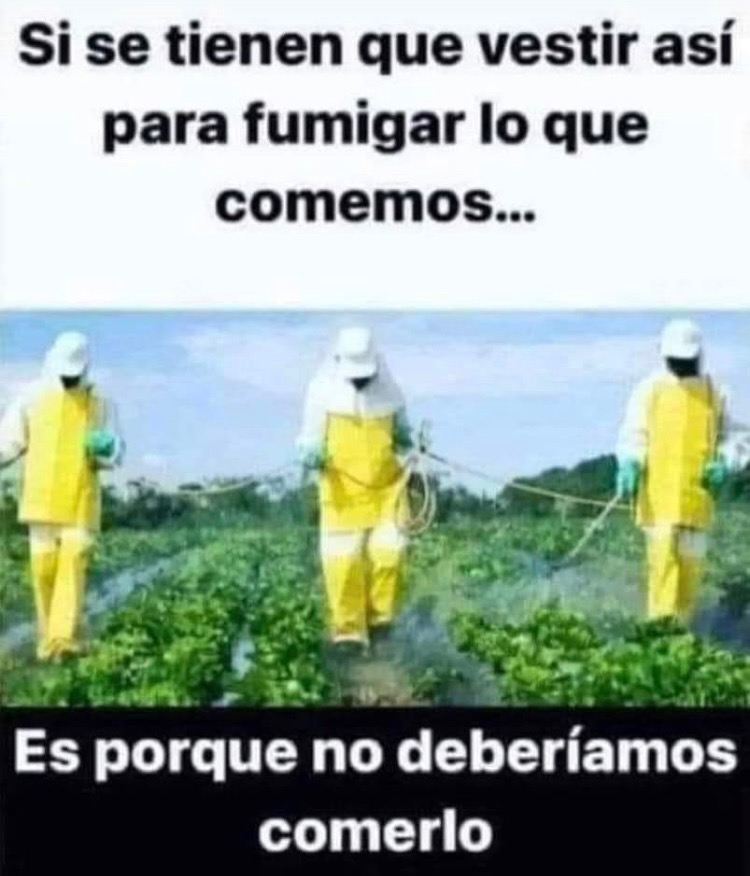
The other day one of my mutual friends posted a picture of food growers wearing head to toe white suits covering their entire bodies as they walked along what looked like a lettuce field, spraying the leaf with chemicals. On top of the picture there was text in Spanish that read “Si se tienen que vestir así para fumigar lo que comemos, es porque no deberíamos comerlo.”
In English this says, if they must have to dress like this to fumigate what we eat, it is because we should not eat it. This immediately confirmed what I already have known to be true.

The principal message communicated is that if the chemical so harmful that contacting your skin is troublesome, imagine what it may cause after consumption.
Most of the food that is grown in the United States and around the world, is sprayed and produced with chemicals, GMOs, and heavy fertilizers that allow the food to grow faster and most times, bigger. It’s the perfect business plan for big corporations that are looking to spend as little as possible investing in labor and time, so that they can get their products to as many as people as possible. While conventional food producers/farmers allow for many people to have access to fruits and vegetables at a reasonable price, there seems to be a better option, organic farming.
Organic farming/production in the United States, is a process that does not allow for chemicals to be used in order to uphold the standards that have been established by the National Organic Program (NOP). These regulations put in place by the NOP assures that food producers marketing their products with the “USDA Organic” label, have followed all the steps required to enter the organic food market. What these food companies contribute to, is a food production system that maintains natural growing methods, and the benefits to their techniques are many. Organic food production eliminates all the chemicals and artificial flavors that are overwhelming linked to the degradation of healthy soil, the cause of many cancers, and instead use farming techniques that promote biodiversity, and nutrient rich soils.
Here are the top five benefits of purchasing organic foods over conventionally grown.
1. Healthy soil maintains nutrient density in foods
When farmers grow organic foods, they maintain many of the nutrients that soils are innately supposed to have. These soils help foods also maintain nutrients that our bodies need to fight diseases and all-around upkeep a healthy immune system. When the soil is healthy the nutrients that are stored in the ground, directly move to the plants or animals that are being grown and raised.
A study published online by the National Institute of Health (NIH) compared food that were grown from poor soil microbiome versus food grown from rich soil microbiome, and the results demonstrated how the humans gut health was directly affected. Sustainable agriculture, and soil healthy, which are many of the practices used in organic, contributed to a healthy plant cycle which made its way to humans. Many health professionals agree that humans need to maintain health gut bacteria, and many researchers have even found that many of the healthy bacteria in human microbiome is closely resembles the genetic makeup of soil and dirt.
2. Biodiversity increases and allows wildlife to coexist with farming practices
Organic farming may require the use of many techniques that allow wildlife and plants to live communally with the farming crops. One of those techniques is known as cover crops, where native plants are planted to make use of the soil and land surrounding the farm. Using cover crops, the water is maintained in the land, and it prevents many environmental consequences like erosions. All around it keeps nearby ecosystems thriving without having to compromise the growth of the food production.
By planting native plants and cover crops, this also attracts many beneficial species, such as pollinators, that help reduce pest control without the use of synthetic or off farm fertilizers. Studies have also found that wildlife habitats are protected, and animals like, birds and other mammals that may be native to the lands surrounding ecosystems can continue to live alongside the farmland. Organic agriculture works together with the land to help form food systems that don’t cause drastic long-term effect on wildlife.
3. Helps saves the bees!
Along the same lines of conserving the biodiversity of wildlife, one of the biggest results in studies of the environmental impacts and benefits of organic farming, concludes that bees are highly present when sustainable agricultural practices are used. The Science Direct, published a study, on small scale agricultural landscapes and organic management support to wild bees, where smaller acreage of farms promoted the lively hood of bees because of the flora in the surrounding areas.
As a direct comparison to the small-scale organic management, report of the almond industry in California, have been known to produce the exact opposite effect. As California remains the number one producers of conventional almonds in the world, the areas where
these orchards are located have been known to basically have an extinction of bees. Studies have shown that just with the almond orchards alone, using organic management would promote varieties of bees to make a return.
The loss of diverse habitat, the use pesticides and poor beekeeping are major reasons for the bees decline. What ends up happening are bees are being “exploited” to meet the natural needs of pollinating these almond orchards.
Sources: https://www.ifis.org/blog/californias-almond-trade-exploiting-bee-population
4. Healthier food may allow you to connect better to what your body truly needs
Although not all organic foods are necessarily healthier for us (like processed foods with tons of added sugars) the essence of making the decision of purchasing organic food, is the beginning of making healthier choices for our bodies. In an ideal world, our diets would only consist of nutrient dense foods and moderate portion sized meals. However, with all the tempting foods out there, it’s hard not eating the occasional ice cream scoop. Yet, when we start engaging with food purchases that are already made with healthier- cleaner ingredients, our pallet for food begins to change.
I suppose this is more on the psychological side of things, but making slight changes to our diet can ripple out into various aspects of our eating habits. Organic foods, and especially organic food stores, have an enormous amount of diversity in produce, and processed foods. As a first-time organic food goer, you’ll immediate learn about alternatives to conventional foods and start to develop a need to learn about what your body needs and what it could probably live without.
5. You can directly make an impact in farmers lives!
Many farmers that work in the organic industry are known to have better working conditions, health, and overall quality of life. For farms owned by families, they do not have to worry about kids joining in on the fields, because there are no harmful chemicals that are being sprayed.
Even more, this also means that there is a local economy that is created for the surrounding community and for farmers that can earn a premium on their products, which can amount to 29%-32% higher than conventional farmers.
Do you purchase organic food?
I’d love to hear your thoughts on organic farming and what you think about organic foods vs. conventional. Feel free to leave a comment down below.
Sources:
- https://fortune.com/2022/09/22/organic-farming-popular-but-not-with-farmers-converting
- Chrome-extension://efaidnbmnnnibpcajpcglclefindmkaj/https://soilhealthinstitute.org/app/uploads/2022/01/100-Farm-Fact-Sheet_9-23-2021.pdf
- https://www.nrcs.usda.gov/conservation-basics/natural-resource-concerns/soils/soil-health
- https://www.usda.gov/media/blog/2015/05/12/hedge-against-drought-why-healthy-soil-water-bank


